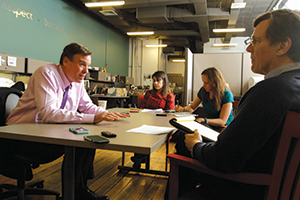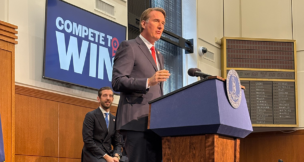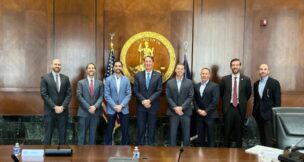The future of work
Warner believes new policies are required in a shifting economy
The future of work
Warner believes new policies are required in a shifting economy
U.S. Sen. Mark R. Warner is the first to admit capitalism has served him well.
After a couple of failed startups, he earned millions in the 1990s as an early investor in the cellphone industry during its explosive growth. (He was featured on the cover of Virginia Business magazine in July 1994 in a profile about his technology investments.)
And yet, he believes capitalism’s focus on short-term returns could be hampering the country’s long-term economic growth. “Do we rethink some of our incentives in capitalism?” Warner asked during a sit-down interview with Virginia Business in late February. “In capitalism today, if you invest in a piece of equipment, it’s an asset. If you invest in a human being in terms of pay or training, that’s a cost. Is there a way to rebalance that a little bit?”
Warner, who is serving his second term as a senator, says statistics show as many as 60 percent of Americans couldn’t afford an unexpected $400 expense. “[We’re] at a real uncertain time,” Warner says, “and the best evidence of that is the political campaign that is playing out right now where people go to the extremes.”
By the end of the year, Warner hopes to outline a policy agenda to help redefine incentives in what he calls “Capitalism 2.0.” He points to ongoing initiatives, such as investor Paul Tudor Jones’ JUST Capital nonprofit organization, which grades companies on measures including sustainability and investment in employees.
The rise of the “gig economy” is another economic shift Warner is watching. He sees a dramatic shift of people working in the on-demand economy, such as drivers for ride-hailing company Uber.
“What is the social contract going to be in the 21st century?” Warner asks. “Our current system basically says there are two classifications of work: You’re an independent contractor, or you’re an employee, and there are certain freedoms or responsibilities that come with each of those classifications.
“I think there probably is going to need to be either a third or fourth-level classification, and there may be a whole ability to create a set of benefits that will be more portable with you,” he says.
Warner is the honorary co-chair of the yearlong Future of Work Initiative of the Aspen Institute, an educational and policy studies organization in Washington. The initiative’s goal is to find concrete solutions to ensure that workers in the on-demand economy have some sort of safety net. The other co-chairman of the program is Mitch Daniels, a former Republican governor from Indiana.
To help get a better handle on the “gig economy,” Warner has asked the Department of Labor to include questions about the on-demand workforce in its May 2017 Bureau of Labor Statistics’ Contingent Worker and Alternative Work Arrangement Supplement (CWS), part of a survey the government uses as its key source for workforce data.
In addition to gauging the economy of the future, Warner is focusing on improving what he sees as a major obstacle to economic growth in the country — student debt.
To that end, Warner has partnered with Republicans to introduce a series of bills, including legislation that would allow companies to offer as an employee benefit the ability to pay down student debt pretax.
Another bill would streamline the process for students to enroll in income-based repayment for federal loans. He also believes federal Pell grants, available to low-income college students, also should be offered to high school students taking dual-enrollment classes. “Even in our public universities in Virginia, the average student comes out with $26,000 of debt,” says Warner. “I think that has huge economic ramifications well beyond the students and their families.”
Warner is also encouraging Virginia companies to take advantage of current growth industries.
Virginia should be primed to manufacture and test unmanned systems, or drones, says Warner.
The senator serves on the Virginia Unmanned Systems Commission. Warner has long advocated that Virginia businesses recognize the industry’s growth opportunity. He also is encouraging the Federal Aviation Administration to finalize rules governing drone usage. “It’s going to be a huge area, and with the military, with activities at [Virginia Tech] and other institutions, we really have a chance to be a leader,” he says.
The cyber industry represents another economic opportunity for Virginia, says Warner, who is a member of the U.S. Senate Select Committee on Intelligence. Warner also sees the need to provide more resources in combatting cyber attacks.
“If you think of traditional military, our national defense, we spend money on ground troops, on Navy, on Air Force. Cyber is almost a whole new domain, and whether they’re criminals, or whether they’re bad guys, they don’t have to have an army. They don’t even have to have a terrorist with a bomb. They can attack us from an office in Shanghai, an office in Kiev or an office or a computer in Morocco.”
During the ongoing battle between the FBI and Apple over encryption, Warner and Republican U.S. Rep. Michael McCaul have introduced a bill to create a commission of legislators, law enforcement and industry representatives to make recommendations to maintain privacy and digital security.
Virginia Business staff discussed a wide range of issues with Warner at the end of his weeklong tour around Virginia.

Warner: The focus has been encryption. I think the focus ought to be digital security because this is so much bigger than encryption. I think even in open testimony the head of the FBI, the head of the NSA, all have said that encryption actually protects America. It protects America’s privacy. It protects our intellectual property. So this idea of you’re pro or against encryption doesn’t make any sense. There are challenges though, whether it’s the San Bernardino shooter, or whether it’s the ability to get access to the information on the phone of the young reporter who was killed outside of Roanoke. My concern is twofold. You want a solution that will work. You want a solution that won’t say, “Well, we’re going to have something that applies to American hardware and software only and simply push consumers to buy Chinese hardware.” And so I’ve partnered with the Republican chairman of the Homeland Security Committee in the House [McCaul] to say, “Let’s elevate this discussion and have a legislatively mandated commission where you get the right people in the room.” I think there are technology solutions here that can protect privacy and deal with civil liberty concerns.
VB: Virginia has been given at least a two-year reprieve on the effects of sequestration. So I would assume, that part of fulfilling this new age economy with things like cyber jobs, unmanned systems, that’s especially important now?
Warner: The definition of sequestration is “stupidity on steroids.” I always loved the fact that, when Congress set this up, they thought, “What was the stupidest thing possible that we could set up to force people into action?” You need tax reform. You need entitlement reform. You need a little more revenue. You need to cut out your longer-term spending. The unfortunate thing was we didn’t get there, and now we’re at $19 trillion in debt. So even with two years relief from sequestration, none of these budget numbers are going back up on any relative basis. So diversify, diversify, diversify.
VB: I read that you’ve been part of an effort on regulatory reform and working in a bipartisan group. Can you talk a little bit about the goals of that?
Warner: There’s a series of reform efforts I’ve been involved with. One is in financial services reform. As somebody who did well in the markets, I didn’t fully appreciate until I got this job how wrong were some of the things that were coming out of Wall Street back in 2009. So the macro approach about more regulatory oversight particularly for the larger financial institutions makes a lot of sense, but the idea that all those same standards need to apply to your local community bank ought to not be the case. So I’ve been very involved in some of the community bank regulatory reform…Report elimination.
There are more reports that come out of Congress that never get read that are taking away from the workforce doing their job… I frankly think we need more look back at provisions on the regulatory side. One of the things about regulation that is very frustrating to me right now is industry always claims [regulations are] going to cost a trillion dollars, and government always claims [they are going]to save a million lives, and yet we never look back and say “How much benefit did we get? How much did it cost? How effective was this regulation?”
VB: Could you expand on your thoughts about the presidential election? Are you backing Hillary?
Warner: I’m supporting Secretary Clinton. I think she’s got the experience. I think she’s got the most pragmatic approach. I’ve been as surprised as most political observers by both Donald Trump’s success and Bernie Sander’s success. I think it’s both sides expressing frustration with the system. I’ve come to the conclusion that, with so much disruption, nobody can predict [what will happen] this year.
VB: Now I noticed that you have made some sort of proposal about addressing the Zika Virus as far as some additional funding.
Warner: I think we just need to get ahead of this, and part of this is additional funding so that we can be prepared research wise. I think it really raises almost a broader question of how do we create the ability to have ready, on-demand vaccinations. We saw Ebola [in 2014]. I think in a connected world, it’s not like these threats are going to disappear. One of the things that somebody suggested to me that I thought was really interesting was the notion of maybe it doesn’t even have to be fully run by the government … [The idea is that] Pharma ought to help contribute to both research and the capacity to surge up on vaccinations…
We more or less called for an increase in funding, and the president did include an increase in funding. I think we will find a way to deal with Zika, but this will not be the last time that we will see new diseases move around the world. I fear sometimes that people feel overwhelmed by the number of challenges, threats.
VB: You mentioned the [Affordable Care Act]. You’ve said yourself that you’ve felt like there needs to be fixes. Is it possible to fix the ACA to make it work smoother?
Warner: I believe yes. I believe after the election, we will [make fixes], regardless of who wins, because a whole crowd of people have been saying, “repeal and replace.” If you go back to my gig economy analogy, and you think about employee versus independent contractor in those two categorizations, some of the traditional Democrats say, “Well, we want everyone to be an employee.”
The truth is we have low- and moderate-income people as employees today. We’ve created this huge cliff between 29 and 30 hours. At one point, you’ve got to provide health care. You look at a lot of Americans right now, they get 28, 29 hours every week because [companies] don’t want to tip the scales over to 30 hours [making them full-time employees entitled to company health-care coverage].
VB: As one health-care professional said, “We have pushed off from the shore. There’s no going back.” Do you think structurally the system has changed so much that it is impossible to [go back]?
Warner: It would be hard for me to imagine a system where you’re going to drop 30 million Americans from health-care coverage. I just don’t see it happening. Have we gone far enough on payment reform so we are actually moving towards paying for quality over quantity? I think we haven’t. We’ve made progress, but we’ve not made as much as we can and should.
We’ve gone through this whole conversation, and I haven’t even given you a rant about the $19 trillion dollars in debt we’ve got now, and [how research and development] investments are half of their 2007 levels. Yes, the deficit is down on much of this, but it’s going to go back up on a basis-point increase in interest rates. A 1 percent increase in interest rates adds $130 billion dollars a year off the top. You can get rid of a lot of sequestration for those dollars.
Every time I talk to a college group, I ask at one point, “How many of you believe you’re going to get Social Security and Medicare?” Now in almost every class, no one believes it… They all agree that people like me should not just have my first $120,000 taxed on Social Security, but a bit more. That continues to be probably my single biggest frustration and disappointment in this: We are sitting on a ticking bomb, and we don’t know when exactly it’s going to blow up, when this debt is going to explode. It calls for making rational choices, but every day, week, month and year we postpone, the slope of those choices get harder to make.
Future of work:
“[There’s a] transformation of work that has been taking place in what we now call the gig, or on-demand or sharing economy …One of the challenges I think we’ve got is how do you allow this innovation to take place but at the same time how do you make sure that there is some level of social assurance? What is the social contract going to be in the 21st century? Our current system basically says there are two classifications of work: you’re an independent contractor or you’re an employee, and there are certain freedoms or responsibilities that come with each of those classifications. I think there probably is going to need to be either a third or fourth-level classification, and there may be a whole ability to create a set of benefits that will be more portable with you.
“The cool opportunity here is there really is a chance to reimagine the social contract. For example, if you choose when you want to work, unemployment insurance may not be a viable option. On the other hand, income insurance might be…
“So the challenge right now is our current structure doesn’t even allow any experimentation. How do you even try to push people to try some experimentation in this area of the economy?”
On student debt:
“I’ve spent a lot of time on college campuses on the question of $1.3 trillion dollars of student debt, which is more than credit card debt. Even in our public universities in Virginia, the average student comes out with $26,000 dollars of debt. I think that has huge economic ramifications well beyond the students and their families. I think if you ask anybody in the homebuilder business, they would say first time home sales are down. I think it’s part of the explanation of why startups are down. This crushing debt box that people get caught in, I think is slowing the economic recovery.” …
“[When I went to school the] cost of a year of higher education was about the cost of a starter car, a basic Ford, both about $5,000. Now cars are maybe $15,000. You go to a private school today, it’s $50,000. This has kind of gotten out of whack. I introduced legislation with Marco Rubio and a couple others that says, ‘Why don’t we have a user-friendly website?’ So you’ve got every university, every community college, [and you’ll know]: How much is it going to cost? How long on average does it take to complete? How much are you going to make in each subject you major in?”
Capitalism 2.0:
“The free enterprise system has worked really well for me, but I increasingly wonder whether modern American capitalism, with its focus on short-term quarterly results only, is really destroying long-term value. When you’ve got an America where 60 percent of Americans couldn’t absorb a $400 unexpected bill without going to a family member or going into potential bankruptcy, you’ve got a real uncertain time, and you know the best evidence of that is the political campaign that is playing out right now where people go to the extremes.
“Do we rethink some of our incentives in capitalism? In capitalism today if you invest in a piece of equipment, it’s an asset. If you invest in a human being in terms of pay or training that’s a cost, but there is a way to rebalance that a little bit. There’s a whole series of companies, “double bottom-line companies,” [with social goals]. And there’s this effort called the B-Corp movement, Benefit Corp Movement, which tries to grade corporate behavior. Mike Bloomberg is trying to lead the sustainability index. Paul Tudor Jones has got obviously great ties here in Virginia and has created something called JUST Capital.
“There’s this movement, but is there a way through some of the policy levers [to shift the focus?] I’m calling it Capitalism 2.0, [a system] that can particularly make pay and training investments in low- and moderate-income Virginians a better value add.”
On cyber security:
“There are both national security concerns and the economic opportunity around cyber. National security wise, I think if most Virginians realize how many times a day every business was under attack from cyber criminals or hackers, they’d be amazed. I fear that it may take some significant cyber attack, a 9/11 cyber almost, to kind of shake us into elevating this issue. …
“The economic opportunity side is the fact that there are 200,000 unfilled jobs, cyber jobs, in America right now. The average salary is $88,000, and we’ve got more of those jobs than any other state. We’ve got 17,000 to 18,000 unfilled cyber jobs in Virginia. So how do we make sure every college and university is certified in cyber? How do we make sure that people, as they move from private sector to public sector, can move back and forth in terms of clearances? How do we ensure that we have an early-stage cyber seed fund so if you’ve got a cyber company here they don’t have to move to the Silicon Valley to get funded?”
On drones:
“Not as a politician, but as a business guy, I predict what will be the next most disruptive technology will be unmanned systems. There were 1 million drones sold at Christmas last year in America. None of them were built in America. Yet, Virginia is one of the six sites that can do [Federal Aviation Administration] testing. We actually have more capacity to test center-driven or driverless cars in Virginia than any other state. With activities at Virginia Tech, some activities in Southside, and with some capacity we have in the [Express] lanes in Northern Virginia, [we have an opportunity to be involved in the] design and manufacture of unmanned systems. It’s going to be a huge area, and with the military, with activities at Tech and other institutions, we really have a chance to be a leader.”

















